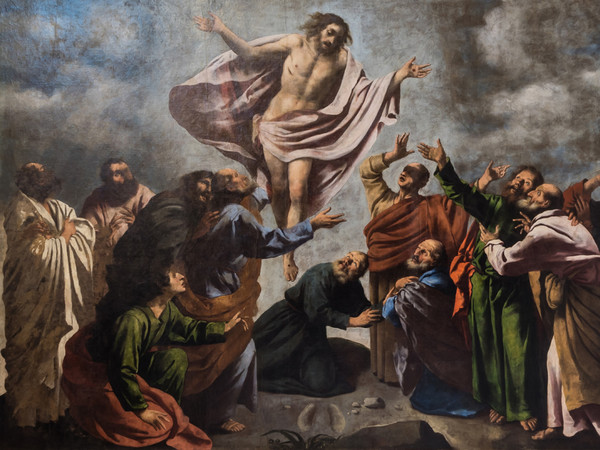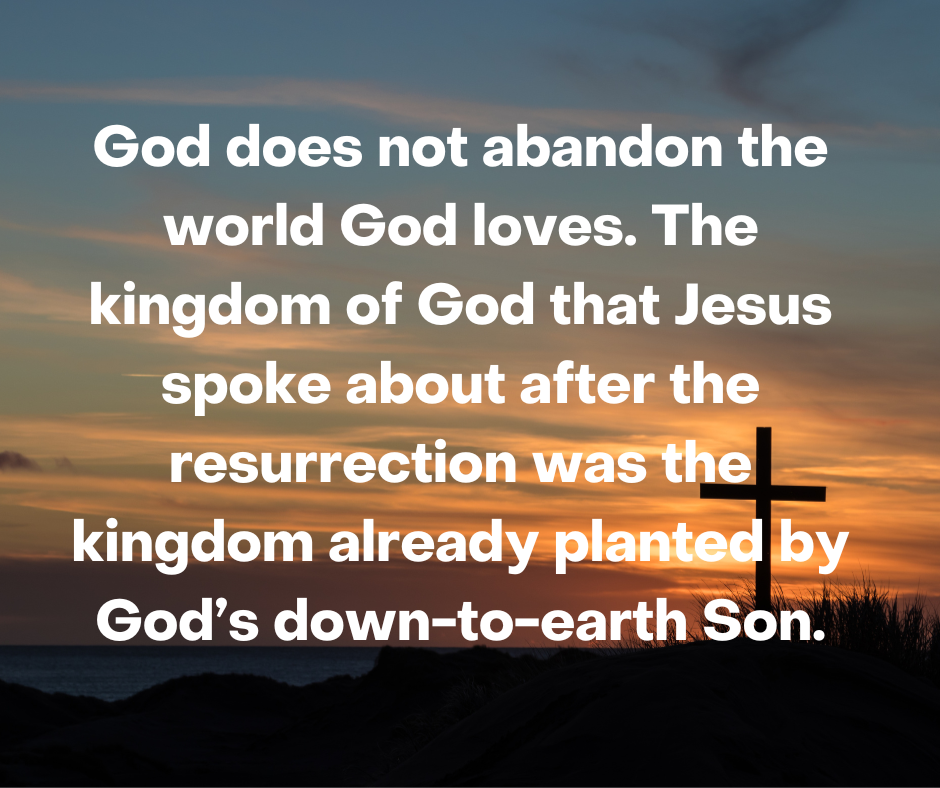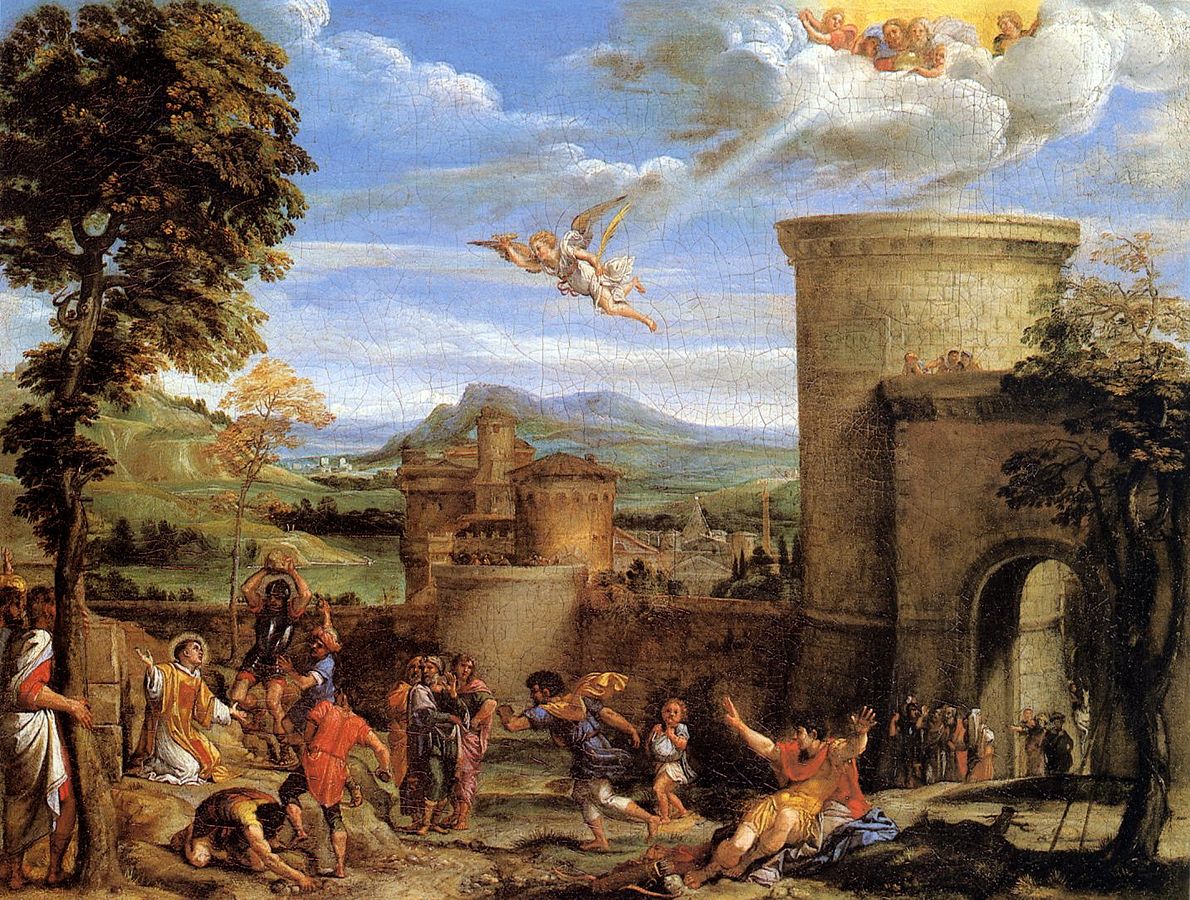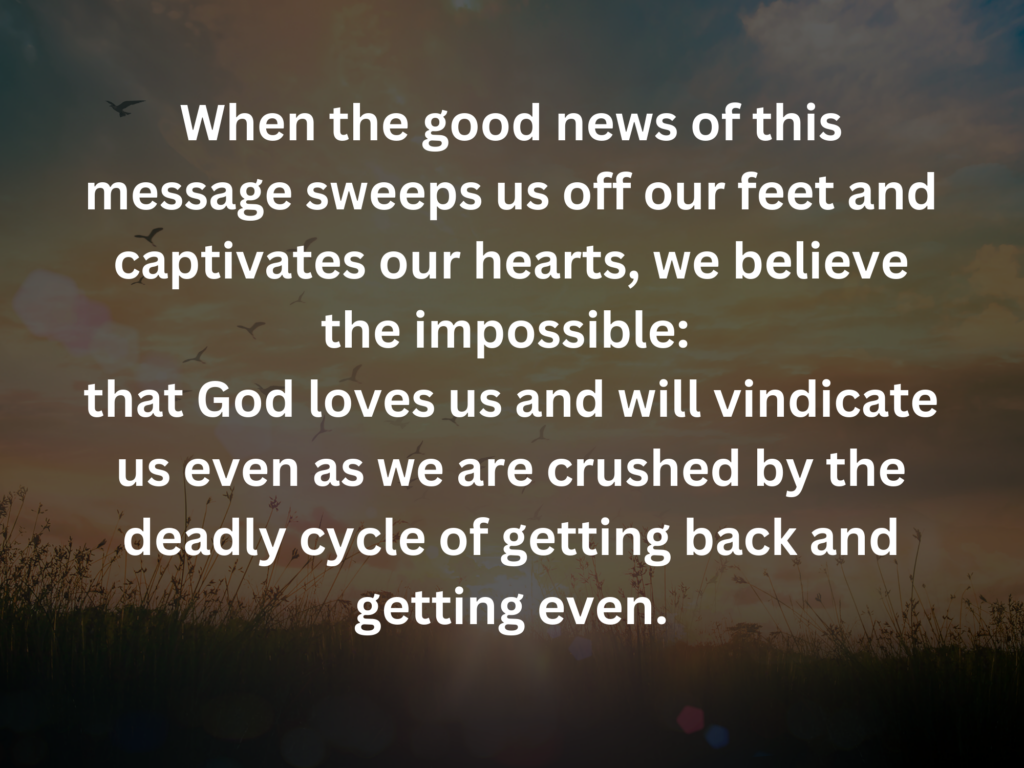Ascension of Our Lord
God’s Right Hand
Acts 1:1-11; Luke 24:44-53
Ascension of Our Lord
Analysis by Lori A. Cornell
44[Jesus said to the eleven and those with them,] “These are my words that I spoke to you while I was still with you—that everything written about me in the law of Moses, the prophets, and the psalms must be fulfilled.”45Then he opened their minds to understand the scriptures, 46and he said to them, “Thus it is written, that the Messiah is to suffer and to rise from the dead on the third day, 47and that repentance and forgiveness of sins is to be proclaimed in his name to all nations, beginning from Jerusalem. 48You are witnesses of these things. 49And see, I am sending upon you what my Father promised; so stay here in the city until you have been clothed with power from on high.” 50Then he led them out as far as Bethany, and, lifting up his hands, he blessed them. 51While he was blessing them, he withdrew from them and was carried up into heaven. 52And they worshiped him, and returned to Jerusalem with great joy; 53and they were continually in the temple blessing God.

Ascension of Christ – Pietro della Vecchia https://commons.wikimedia.org/wiki
I am not a big fan of “harmonizing” texts. But because the author of Luke is also the author of Acts I have taken license to put the pieces together here, to create a more complete picture of the challenge and promise of the Ascension.
DIAGNOSIS: Left-Hand When Necessary
Step 1: Initial Diagnosis (External Problem): Impatient for Change
To wait is to delay action. “Stay here in the city,” Jesus said to his disciples. They knew they were waiting for “the promise of the Father” (Acts 1:4), “to receive power from on high” (Luke 24:49). But would they know this promise or power when it came? Luke tells us the gift of the Spirit was unmistakable. But the time of Jesus’ Ascension is this weird in-between time: 10 days where the disciples had no idea what exactly they would experience. So they had to wait. And waiting is a whole lot less pleasant than opening the gift. Delaying action can make you question your assignment: Were they capable of whatever ministry Jesus had in mind for them? Waiting can also make you impatient. Jesus had clearly said that the disciples were going to remain in the dark about some things, including when and how the kingdom of Israel would be restored (Acts 1:6-7). But who wants to remain in the dark about the things they have been told to wait for? Having Jesus leave them behind had to have been disorienting enough. Now the only action they were expected to take was to delay action.
Step 2: Advanced Diagnosis (Internal Problem): Ain’t Nothing Gonna Change
Imagine you’ve been waiting a long time for the world to change. But you continue to live under an oppressive Roman regime and a religious leadership that encourages the crucifixion of those who preach love, forgiveness, and grace. Imagine that the only clear evidence you have of that change has come in the form of a man named Jesus, who has crucified but also, amazingly, has been raised from the dead to give you a 40-day crash course in carrying out his mission. Forty mind-bending and jaw-dropping days of hope in which your expectations of the world and God were turned upside-down. Now, imagine that this Jesus has just disappeared into the sky.
Karl Barth called the time between the Ascension and Pentecost “a significant pause.” But I have to wonder if it felt more like dreams dashed. Jesus was gone again, and the disciples were left waiting in a recently-hostile Jerusalem alone. If you are supposed to “wait and pray,” for what do you pray? Luke tells us that they worshiped, but only a few verses before this he says that “in their joy they were disbelieving and still wondering” (Luke 24:41). If that change actually came, could they—the disciples—actually be a part of it?
Step 3: Final Diagnosis (Eternal Problem): Left-Handed Justice
When we can’t see God, we are vulnerable to fear and cynicism. Fear that God doesn’t keep his promises. Cynicism that changing the world is too big a project even for God. Like a child just beginning to learn “object permanence,” we imagine that when we can’t see God, God must not be there. What we miss is that the God who was just in the room (in Jesus) has already changed us and the world around us. We miss that even our waiting is altered by Christ’s death, resurrection, and commissioning of the church. We miss that we have a calling—even as we wait. We miss hope. And life without hope is Christless.
PROGNOSIS: Right-Hand Always Necessary
Step 4: Initial Prognosis (Eternal Solution): God’s Human, Right-Hand Intercession
The hope that comes with the resurrection of Jesus is that the “God whom we cannot see” is, in Christ, just as good as Jesus in the flesh. Forty days of crash-course-seminary instruction taught the disciples that. God does not abandon the world God loves. The kingdom of God that Jesus spoke about after the resurrection was the kingdom already planted by God’s down-to-earth Son. A Son who had now ascended to sit at the right hand of the Father (Acts 2:33). And from God’s right hand, Jesus would fulfill his promise to deliver power from on high. The Jesus who first ascended to the cross and descended to the dead, had now ascended to heaven to bring his promises full circle in the form of the Spirit at Pentecost.
Step 5: Advanced Prognosis (Internal Solution): Could the World Be about to Turn?
Luke explains in Acts (1:5) that the “power from on high” Jesus promises will be the very Holy Spirit that descended on him at his own baptism. The disciples will be “baptized” with the Holy Spirit. That had to be a lot for the disciples to take in. But Jesus had been raised from the dead; he had already delivered on the promise of resurrection. And waiting for the Holy Spirit for ten days was hope-filled, which made the wait easier.
So it is for us: We wait in hope. We die to our old self daily, and rise in Christ. We mark ourselves with the cross, and we expect God will be active in and through us each day. We even take time out of life’s busyness to recall all that Jesus taught us, and “worship God with great joy.” We pray fervently to the God who delivers on his promises. And, in those moments where in our joy we are disbelieving, we pray: “Come, Lord Jesus.” And, “Come, Holy Spirit.” And he does.
Step 6: Final Prognosis (External Solution): Expecting the Change from the Inside Out
Because Christ had risen and walked with the disciples for 40 days, the time between Ascension and Pentecost was finally a time of hope-filled waiting. Jesus had planted resurrection faith in them, and Jesus would deliver his promised Holy Spirit. That left them with ten days in which they could rest in those promises—in prayer and thanksgiving, in reflection and fellowship.
This pattern—prayer, thanksgiving, reflection, and fellowship—is a pattern the early church assumed and that we continue to this day. We pause “significantly,” and turn ourselves first to the one who is the source of our life. And then, having been gathered and enlightened by the Holy Spirit, we are sent. The world that Jesus “turned upside down,” is changed first in us. We seek out Christ’s promises, we examine and repent of who we have been, we are fed on the one who offers his whole self to us, and we look away from our own selfish impulses and see the needs of our neighbor. Indeed, the world is about to change: from the inside of us and our community of faith, rippling out to the ends of the earth.


